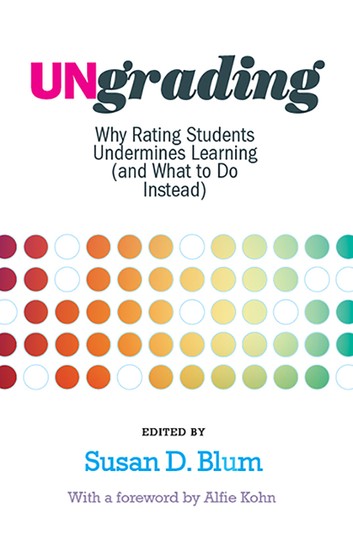Big Idea: Eliminating grading increases student motivation and learning
Ungrading is the practice of minimizing or eliminating grades in order to focus on meaningful feedback and student learning. Proponents of ungrading suggest that grades themselves are artificial: they reduce learning of complex ideas into one single letter. Problems like grade inflation, inconsistent meanings of grades (Is a B in one course equal to a B in another course?) and grading on the curve are all artifacts of a system intended to differentiate, categorize, and compare people. From an educational development perspective, grades are not essential for learning.

Given that grades are so entrenched in higher education culture, how can we move towards ungrading without compromising educational standards?
The answer lies in our underlying assumptions of the purpose of educational standards. Grades are proxy measures of what we consider learning and are influenced by our own cultural biases and colonized practices. As we think deeply and engage in decolonizing educational institutions, practices, and curriculum we need to rethink the role of the grades. The ungrading movement suggests let’s focus on learning, critical reflection and meaningful feedback so that students can improve.
“Grading and assessment are two distinct things: and spending less time on grading does not mean spending less time on assessment”. Jesse Stommel, Ungrading.
Student-centered feedback is an essential element of ungrading. The grades are minimized but the feedback is not. One common question is: How can I ungrade if I have to submit grades to the university at the end of the semester? It turns out that ungrading it not completely gradeless. Most frequently, a course will focus feedback and formative assessment and at the very end of the course the faculty member and student will agree upon a grade. But won’t student just inflate what grade they should get? My experience is no. I have used student self-evaluations for years and students are very realistic about their own learning.

A new book Ungrading edited by Susan Blum (2020) is an excellent resource for faculty considering ungrading. The authors from a variety of disciplines share their journey into ungrading: what worked, what didn’t, and why they continue to advocate for ungrading. Join the CTE’s bookclub on ungrading.
Quick Ungrading Ideas:
- Use ePortfolios to encourage student reflection and self-assessment
- Incorporate ‘do-review-redo’ into your learning activities. This focuses on iterative feedback rather than grades.
- Use peer-assessments
- Implement authentic assessments (e.g., organize a campus event)
Ungrading Resources:
Jesse Stommel (March 2018). How to Ungrade
Jesse Stommel (March 2020). What if We Didn’t Grade?
Blum. S (November 14, 2017). Ungrading: The significant learning benefits of getting rid of grades.
Buck, D (2020). Crowdsourcing Ungrading
Schinske, J., & Tanner, K. (2014). Teaching More by Grading Less (or Differently). CBE life sciences education, 13(2), 159–166. https://doi.org/10.1187/cbe.cbe-14-03-0054
Image courtesy of Queer in Tech CC BY 3.0 US Mapbox Uncharted ERG

Recent Comments